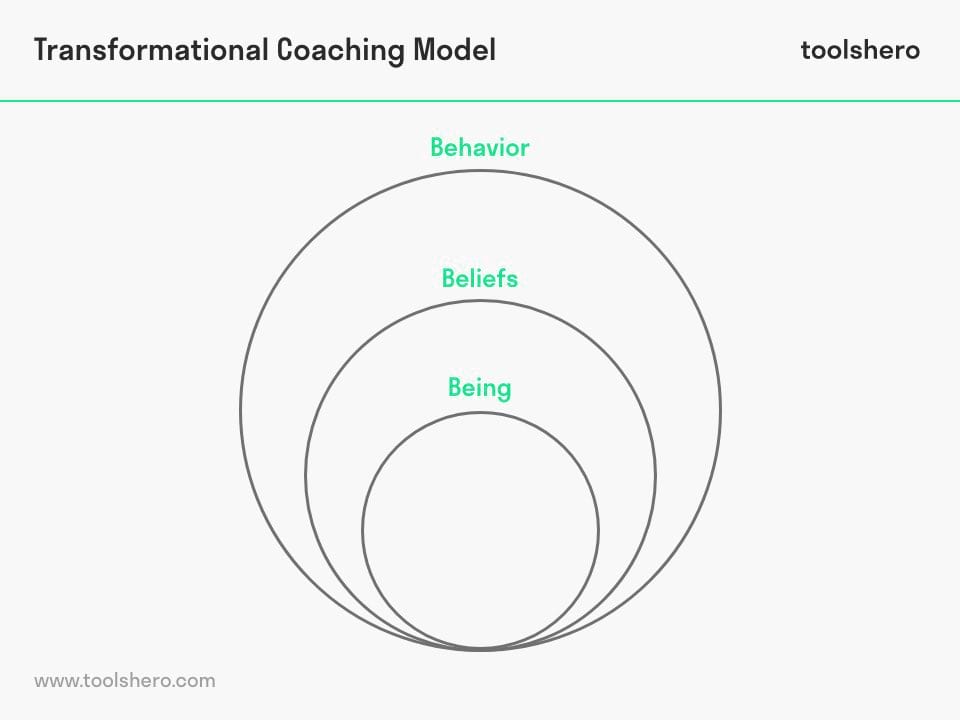Transformational coaching explained

Transformational Coaching: in this article you will find a practical explanation of Transformational Coaching. This article covers what transformational coaching is, how transformation and change are not the same, what the five steps are for transformation coaching, what its advantages are and what the role of the coach is. Enjoy reading!
What is Transformational Coaching?
The definition of Transformational Coaching
Transformational Coaching is a method to restructure the inner person and put transformational changes into action with the intention to self-realise the changes.
In order to have a complete understanding of this topic, it is necessary to understand that this type of coaching does not focus on the achievement of goals, but rather on improving pro-activity and strategies to put into action what you want to achieve, either as an individual or with a team to achieve objectives.
Transformational Coaching focuses on BEING and not on DOING. This means that it is a method that seeks the internal development of the human being in favour of his or her desires. From the beginning, it looks at who the person is and what he/she wants to become.
In order to be effective when applying this method, one must first understand what personal transformation is and why it is important.

Figure 1 – The Transformational Coaching Model
Transformation and change are not the same thing
Every individual goes through certain situations of change in their life that lead them at some point to become aware and ask themselves whether these changes have been due to positive or negative actions in the way of life they lead. Changes can lead to positive situations or to situations with stormy or negative results. However, a change does not mean that it automatically is a transformation.
Many human beings make changes in their lives from small actions to big actions very often, for example:
- Changing daily habits such as waking up at 5 AM instead of waking up at 9 AM. A person could decide to change and wake up at 5:00 AM so that the day will be more productive since
- A person moves to another country, learns the culture, learns the language of the new country. However, these are changes that the person makes because it is necessary to adapt to a new environment.
This means that human beings are constantly changing because of their decisions. These decisions lead to actions and these actions, insignificant as they may seem, bring positive or negative results. But transformation is something that is not an everyday thing that goes beyond the simple daily actions that are done in life.
Transformation is something internal that rarely occurs in a person, meaning that the individual has gone through some difficult or complicated process or situation in his or her life that has left a psychological mark on him or her.
This is why transformation is something that rarely occurs in human beings, but is radical in terms of effect.
Transformational Coaching is focused on “being”.
In a more sensitive and supporting way, this type of coaching aims to help people who want to transform their lives. Many of them feel are lost or need to eliminate bad habits, patterns and negative actions that are constant in their lives and that do not allow them to develop their skills or potential.
To be able to carry out the Transformational Coaching process, the coach must help to identify and interpret the actions of the past that do not allow the individual to achieve positive development in their personal and professional lives.
These actions could also continue to present themselves in the future if a person is not aware of what are these negative actions are. TC is also the means to achieve the transformation that a person needs. Self-discovery and self-awareness helps to discover a purpose like achieving goals.
By knowing who the person truly is and what they want to achieve, the dreams and goals will come together in coaching for the transformational life coach to guide the process of achievement.
The five steps of Transformational Coaching
There are 5 proposed steps that are usually made in the coaching process.
Step 1: Recruitment
It is necessary to carry out the process of hiring the right coaches for the changes needed by the company or the specific person who needs this coaching process.
Step 2: Listening
In this phase the coach should listen carefully and let the other persons express themselves in order to have a basis of knowledge about the person’s thoughts and emotions. By listening carefully, the coach can extract the right information to be able to ask the right questions and invite reflection.
By listening, one can identify actions, behaviour and emotions in order to help in the transformation.
Step 3: Exploring
In this phase, inner exploration is vital in order to help in the transformation of the person. Exploring thoughts can help to align why the person has certain behaviours that do not allow them to move forward in their personal or professional life.
It is important in this phase to ask deep questions that invite reflection on emotions.
Step 4: Action
This stage is about the resolution of internal conflicts and how these can be improved in good actions. It is necessary to stimulate the practice of positive behaviours and how to deal with difficult situations in some life scenarios such as at work. How to deal with stressful situations with a work team, analysing and reflecting internally in order to be able to externalise it in a positive way to the work team.
Step 5: Review
Last phase to review the coaching session on the results it gave in relation to the person’s feelings and how they positively or negatively affect their behaviour.
Emotions, beliefs and thoughts are the main focus points in transformational coaching. The process aims to identify specific events that the person experienced and what actions generated these events in his or her life and modified his or her behaviour up to the present.
It deals with the question how to develop new positive patterns for personal and professional life and how the person wants to see him/herself in the present and in the future with the transformation of his/her actions.
Transformational Coaching: The role of the coach in self-discovery and personal development
The coach’s accompaniment and knowledge will help to identify and explore the inner individual in a personal and close way.
After self-discovery the following question must be asked: what is needed to achieve the goals? This is where the transformational process comes in to evaluate the beliefs, interpretations and purposes that the person has and how they have experienced that throughout their life and what results they have obtained.
The role of the transformational coach helps people to change and transform those bad habits and to develop and empower new skills that the person lacked before. Confidence as an essential factor in personal self-discovery as the subject can reflect and express their “I” in the actions of everyday life and how these actions are given a positive meaning for good results after fulfilling the objectives they want to achieve.
Advantages of Transformation Coaching
- Orientation to achieve positive results
- Helps to interpret the decisions and actions that the person has taken in his/her life.
- Helps to focus decisions and actions to achieve what the person wants to achieve
- The coach helps to change interpretations if they are no longer necessary.
- Helps to reach the individual’s full potential
With the above effects, a transformation can take place that will generate better actions and will result in the desired and expected results for the person. The process always starts with the intention of achieving results meaning a positive transformation in favour of actions that will bring more well-being in their life.
Coaching will always be oriented to the fulfilment of the objectives in the achievement of the positive results, that is how to solve the questions that the person wants to transform and what he/she wants to become are essential in the present. The results must be measurable in order to have a control of how the process is going.
Tangible indicators for the achievement of objectives are essential and are not overlooked in this type of coaching as this will give more security to the person involved in the confidence of their transformational process and for them and the coach to know when the objective has been met.
Transformational Coaching: transformational life coach
It is not the role of the coach training to demand or pressure the person who wants to have a transformation to have it under certain circumstances of pressure or speed. Despite their coaching certification, the coach is a fellow traveller from the coaching client who invites reflection and accompanies the person on their journey of self-discovery the search for a happier and more fulfilled life.
Without judging, without overshadowing, he or she helps the person to express his desires and wishes as a human being. Accompanying and monitoring their processes of improvement and development of their skills and thus achieving personal success.
The equal coaching relationship is essential for stronger trust so that the coach can help to identify those limiting patterns of negative thoughts that in many situations become toxic and routine actions that make the person not to reach the tranquillity of his being. This equal relationship is important in all forms of coaching: from real life coaching sessions to online courses.
This is why life can become transformational as it is possible to start the transformation internally and externalise that transformation into actions in daily life as being free of negative thoughts can lead to changing the behaviour and actions that a person has.
The focus then of the coach is to enhance inner growth and help the exploration of the self as a driver of action. The being influences the doing, first it is necessary for the person to know him/herself, in order to be able to take the best actions for his/her life.
Conclusion
Transformational Coaching is focused on the spiritual dimension of the person, their BEING as a reference to the motivating impulse of their life. The method is used to empower and reflect in order to transform behaviour and emotions so that these factors have a positive influence to achieve personal and professional success.
This type of coaching is most often used when a person feels lost or a company feels that there is a lack of humanisation in its employees. Everyday life can lead to the confinement in the comfort zone and that actions become repetitive and “normal” but these actions do not always bring positive results, they can also be negative results that become patterns in the behaviour of human beings and therefore do not let them transcend.
This is how Transformational Coaching invites you to work on the formation and learning of new changes that can lead to the transformation of a person to feel happy and positive in life, going deep into the inner self as a human being.
It’s your turn
What do you think? Is Transformational Coaching essential in today’s companies in order to humanise their employees and prevent them from losing their inner essence? Have you used this type of coaching in your company or on a personal level? If so, could you please share your experience with us? Do you have anything to add or any suggestions?
Share your experience and knowledge in the comments box below.
More information
- Hawkins, P., & Smith, N. (2010). Transformational coaching. The complete handbook of coaching, 231-244.
- Umidi, J. (2005). Transformational coaching. Xulon Press.
- Turnnidge, J., & Côté, J. (2017). Transformational coaching workshop: Applying a person-centred approach to coach development programs. International Sport Coaching Journal, 4(3), 314-325.
- Cox, E., Bachkirova, T., & Clutterbuck, D. A. (Eds.). (2014). The complete handbook of coaching. Sage.
How to cite this article:
Ospina Avendano, D. (2021). Transformational coaching. Retrieved [insert date] from Toolshero: https://www.toolshero.com/management/transformational-coaching/
Original publication date: 12/10/2021 | Last update: 10/23/2023
Add a link to this page on your website:
<a href=”https://www.toolshero.com/management/transformational-coaching/”>Toolshero: Transformational coaching</a>












